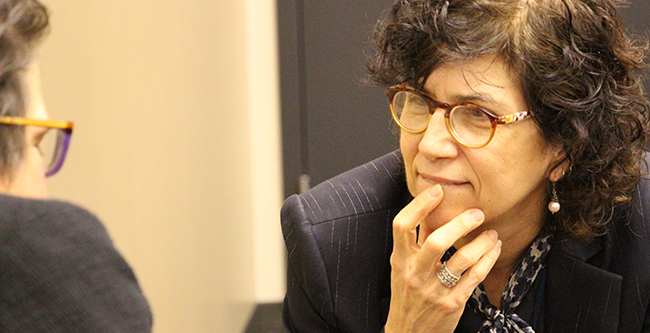
Photo by Matt Schorr
Allegheny County Health Department Director Karen Hacker, MD, MPH discussed health disparities with researchers and community members at the Meharry-Vanderbilt Alliance earlier this year.
NASHVILLE, Tenn. Allegheny County Health Department Director Karen Hacker, MD, MPH addressed researchers, clinicians and community agencies at the Meharry-Vanderbilt Alliance to discuss health equity and population health.
“The challenge we always face is, how do we deal with health disparities?” she told a packed house earlier this year.
Hacker’s presentation, “Identifying and Responding to Health Inequality: A Health Department and Community’s Challenge,” highlighted the various social determinants all societies face and outlined plans to improve community health.
Social determinants, she explained, are predictors of health. A determinant is a circumstance in which people live, work and age, as well as the systems in place around them.
Allegheny County, where Hacker has served as Health Department Director since Fall 2013, is the second-most populous county in Pennsylvania. According to the United States Census Bureau, the population was 1,231,225 as of 2014. It’s county seat, Pittsburgh, is considered the “Steel Capital of the World.”
Industry is a major part of the area’s legacy, Hacker explained. That, along with demographic shifts and gentrification, has impacted the population’s health in various ways.
“As a health department director, I have to understand my community,” Hacker said.
Significant health disparities exist between whites, blacks and other minorities. Homicides represent the 15th leading cause of death in Allegheny County, with deaths among black males numbering significantly higher than any other demographic. Likewise, infant mortality rates, although in decline, are also higher among African Americans.
“The role of the community is important in determining health outcomes for all who live there,” Hacker said. “Ultimately, it’s going to be the communities that affect change.”
In 2015, Hacker’s department enacted the Plan for a Healthier Allegheny. It included collecting data, mapping data and working together to target efforts in particular areas. The data was used to generate a health disparities dashboard, county health survey and social determinants warehouse. That warehouse compiled data ranging from health inputs like obesity rates and medical claims to environments and demographics.
Live Well Allegheny is one of many target programs implemented that address food access, healthcare access and more. Over the years, the campaign has expanded into 12 new communities, four new school districts, six employers, 60 restaurants and 30 new community partners.
Next steps include health equity briefs by the Public Housing Authority, modeling the collected data and increasing public availability and profiles.
Hacker is also an Adjunct Professor in Health Policy and Management, an Adjunct Professor in Behavioral and Community Health and a Clinical Professor at the University of Pittsburgh School of Medicine. Prior to her current position, she was Executive Director of the Institute for Community Health and the Senior Medical Director for Public and Community Health at the Cambridge Health Alliance, with appointments at Harvard Medical School and School of Public Health. She received her undergraduate from Yale University, her MD from Northwestern University and her MPH from Boston University. She completed her residency in Internal Medicine at Boston City Hospital and her Adolescent Medicine Fellowship at Children’s Hospital of Los Angeles.
About the Meharry-Vanderbilt Alliance
Founded in 1999, the Alliance bridges the institutions of Meharry Medical College and Vanderbilt University Medical Center. Its mission is to enrich learning and advance clinical research in three primary areas -- community engagement, interprofessional education and research -- by developing and supporting mutually beneficial partnerships between Meharry Medical College, Vanderbilt University Medical Center and the communities they serve. Through community engagement, the Alliance serves a large community of stakeholders including surrounding universities and colleges, community organizations, faith-based outlets and community health centers. Its interprofessional education enhances students' interdisciplinary understanding and improves patient outcomes through integrated care. The research conducted provides access to experienced grant writers and materials supporting the grant application process and facilitates grant-writing workshops.



